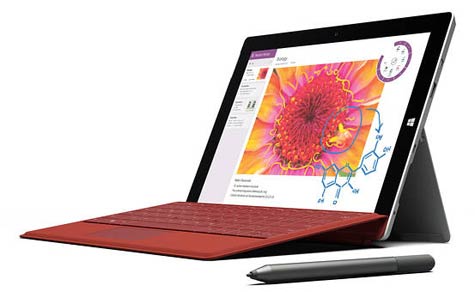Right now the fight for the next business tablet is between Apple, which has the unofficial lead largely thanks to bring your own device, or BYOD, and Microsoft Surface, the most successful Windows-based tablet. Apple has been aggressively signing major partners, first with IBM and most recently with Cisco, both firms that are long on enterprise capability but relatively light on personal devices. Today, Microsoft countered with deals with Dell and Accenture.
Let’s carve out this competition.
Device: Surface Pro vs. iPad
The iPad is still the product that defines the segment, but it has been in decline. The problem is, as a device, much like the iPod, the iPad is relatively limited. Apple has intentionally kept a strong break between the iPod/iPad/iPhone and the Mac line. The strategy appears focused on maximizing the revenue out of every customer, thus there is little overlap between the mobile devices and the PCs. In fact, Apple seems to want every customer to buy one of each, which creates a problem for folks who want to work off the iPad. It is sub-optimal as a work device, with poor pen support, and while productivity tools have improved strongly, it is still far less ideal than a MacBook Air for those who want to work on it.
Microsoft is approaching this very differently, using the two-in-one concept. Surface is basically a blend of an iPad and a MacBook Air running Windows. Pro is more laptop than tablet, and Surface 3 is more tablet than laptop, bracketing the opportunity. Designed to focus on productivity, these do allow a user to use one device where they would typically need two. It has far stronger pen support and the Pro Version has a screen size more appropriate for forms work than the iPad does. However, it is weaker in some of the areas where the iPad is uniquely strong, like in the variety and depth of apps. Still, for those who want a tablet that does two things, particularly if they prefer Windows, Surface is the stronger choice. For a focused device on entertainment, the iPad is still king, but for business, that entertainment advantage may be a disadvantage because IT typically doesn’t like buying tools that employees will use as toys.
Partners
There is no product overlap between IBM and Cisco for Apple, however, they would likely prefer a device that was far more business-centric (more robust, stronger pen support and security) than what the iPad currently offers. But it is doubtful that Apple will create the business version of the iPad that Cisco and IBM would prefer; that would increase costs and adversely affect revenues by increasing SKUs and forcing a marketing spend to create demand for what would be a very different product. (Though Tim Cook, who came out of Compaq, would uniquely understand this need and might eventually bow to it if he sees Surface taking significant share.) Cisco and IBM really lack a client channel. Cisco divested or shut down most of its consumer offerings and IBM sold off the IBM PC company; both took with them whatever distribution they had. So both firms would be using sales teams that more often sell large system solutions, and getting these folks to sell tablets and PCs will be problematic.
Microsoft’s issues are very different. Like IBM and Cisco, Accenture doesn’t really have a device sales capability but it does focus on areas where a tablet could complete a solution, like for a dedicated tech, administrator or user device for some complex backend system. It is getting the full set of mobile products, though: Surface, Surface Pro and Lumia (IBM and Cisco will likely have similar success with the iPad and iPhone in these areas, but Apple wants the product relationship with the customer to be its own, creating potential conflict). IBM and Cisco can assure security (Cisco has some unique networking capability here) and the lack of much of an entertainment application base is actually an asset when a device is used in this fashion. Dell does have product conflict; it is in the number two spot for Windows tablets, so while it actually has the strongest channel for Surface, its sales teams will be torn between Dell’s own offerings and Surface. This suggests that Microsoft will still need to generate the demand and then that demand will pull Surface through the Dell channel. Dell is increasingly focused on the more lucrative services that surround managed deployments, and PCs in this kind of a deal tend to be very low margin, when compared to the rest of the solution anyway, so the product conflict issues should be reduced but will still need to be watched.
Wrapping Up: It’ll Come Down to Execution
It is going to come down to execution. Ideally, IBM and Cisco need Apple to tweak the iPad just a little in order to make it a segment king. It needs stronger pen support at least, and ideally a more robust design (though this last can be offset with a case). On the positive side, the iPad is the more desirable product from the user perspective even it if isn’t from IT’s perspective. Microsoft needs to close the app gap aggressively so more users want Surface and it isn’t being sold against user demand. The Dell product overlap will need to be mitigated more over time and Microsoft will likely need to carry much of the marketing burden for both Accenture and Dell with regard to Surface.
So Microsoft’s path is harder, but then Apple is going to resist the easier path it has, which is what makes this a race. In the end, if you want the iPad for business, you should likely be looking at Cisco or IBM. If it is Surface you want, then Dell (unless it is part of an Accenture deployment). I think the biggest winner is likely Dell. Regardless of whether Surface or Dell’s tablet is chosen, the firm that gets the backend business will likely be Dell. Though I think this would be stronger if Dell also picked up the full Microsoft line including the phones because it currently lacks a phone solution.
We’ll see how this all plays out. But on execution, the Dell/Microsoft relationship is the most tested while all of the others are new. One of the huge advantages Microsoft holds over Apple is a stronger ability to partner. So on product, Apple has an edge but it is also its own biggest impediment, and if it does come down to execution, that will be the biggest problem across all these relationships to solve.
Rob Enderle is President and Principal Analyst of the Enderle Group, a forward-looking emerging technology advisory firm. With over 30 years’ experience in emerging technologies, he has provided regional and global companies with guidance in how to better target customer needs; create new business opportunities; anticipate technology changes; select vendors and products; and present their products in the best possible light. Rob covers the technology industry broadly. Before founding the Enderle Group, Rob was the Senior Research Fellow for Forrester Research and the Giga Information Group, and held senior positions at IBM and ROLM. Follow Rob on Twitter @enderle, on Facebook and on Google+




